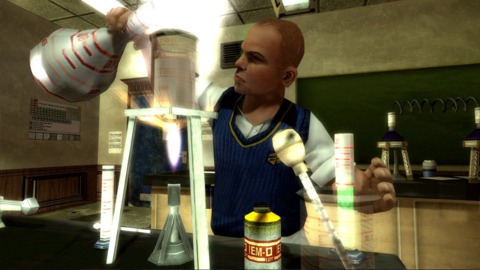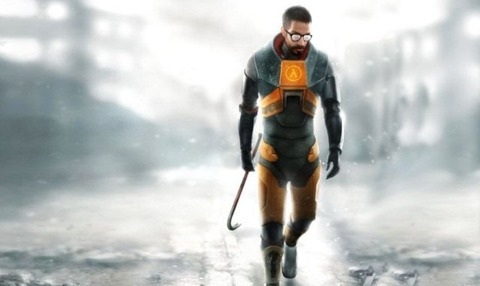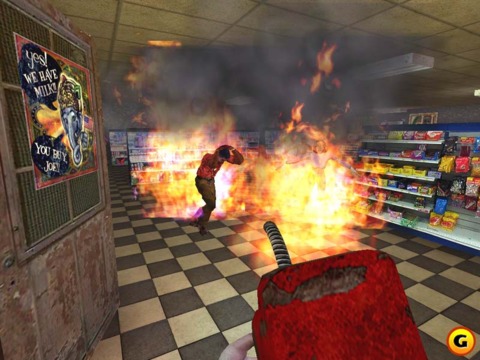Games' Day in Court: Science, Violence, and the Law
A look at the debate behind the debate and what the Supreme Court's decision could mean for the future of games and beyond.

It was more than seven years ago that California Assemblyman (now Senator) Leland Yee first introduced a proposal to ban violent game sales to minors. The fight over that proposal--signed into law in 2005 but legally contested before it could take effect--is finally ready for resolution, as the US Supreme Court is set to hand down its decision on the matter in the coming weeks.
Before the court releases its decision on Brown v. Entertainment Merchants Association (formerly Schwarzenegger v. Entertainment Merchants Association), it's worth taking a closer look at the factors that have helped fuel this fight for the better part of a decade, as well as stepping back for a look at the larger implications here for gaming in specific, and culture in general.
The case currently before the Court deals with the First Amendment and freedom of speech, specifically whether the government is allowed to limit that freedom to protect children from being exposed to violence, similar to the way it already does with sexual material. A major point in that debate has been whether or not the state can demonstrate a compelling interest in keeping violent games away from children, with both the government and the industry claiming the science supports their side.
That's a conflict beyond the one spelled out in the case title of Brown v. Entertainment Merchants Association, one between a pair of academics who have spent their careers researching the effect violent games have on people and contradicting each other at every turn.

Tale of the Tape
Iowa State University researcher Dr. Craig A. Anderson has been publishing research on the effects of video games since 1986. Anderson has found that violent games increase aggression (behavior intended to harm another) in children. His work has been pointed to by proponents of gaming restriction laws as evidence that their measures are necessary. In Senator Yee's amicus brief to the Supreme Court, he cited 17 articles from scientific journals; Anderson was an author on seven of them, with his previous collaborators authors on six more.
For an article published in The Journal of Personality and Social Psychology in 2000, Anderson had 210 university students play either Myst or Wolfenstein 3D, completing a series of tasks after each of three sessions with the game. After the first session, participants took surveys designed to measure their hostility at that moment and perception of how dangerous the world is. Following the second session, they took a test that measured "aggressive thinking" by how quickly they were able to read aloud words deemed aggressive ("murder") versus those dealing with anxiety ("humiliated") or escape ("leave") or neutral control words ("consider").
After the final play session, the students took a competitive "noise blast" test to measure aggressive behavior. The participants were told that upon prompting, they had to press a button in front of them faster than another student was able to do the same. The loser of that race would then receive a noise blast at a length and decibel level determined by the winner, which was the data used to quantify aggression. The outcome of each race, as well as the actual volume and length of the noise blast delivered, was computer-determined to ensure the win-loss pattern was the same for each participant.
Anderson found playing violent games was correlated with a short-term increase in aggression, in both the hostility survey and the noise blast test. Additionally, students who reported playing violent games regularly also engaged in more aggressive behavior, according to the study. Given the results, Anderson determined that "concern about the potentially deleterious consequences of playing violent video games is not misplaced."
Standing opposite Anderson is Texas A&M International University criminal psychologist Dr. Christopher J. Ferguson. Since 2004, Ferguson has been researching the issue (publishing articles on it since 2007) and has dismissed the notion that violent game exposure leads to violence in real life. Ferguson is a comparably popular person to cite for the Entertainment Software Association, with the trade group's own Supreme Court amicus brief citing seven research papers, four of which were authored by Ferguson.
As an example of Ferguson's research, last year he had a paper run in European Psychology in which he surveyed 103 university students who were given a test designed to increase frustration and then spent 45 minutes playing violent games (Hitman: Blood Money, Call of Duty 2), a non-violent but still action-oriented game like Madden 2007, or no game at all. The participants then took the same "noise blast" test Anderson used to determine aggressive behavior (although Ferguson tweaked the process of interpreting the data), as well as quizzes designed to measure hostility and depression.
Ferguson found no evidence that exposure to violent games changed aggression levels, or that the short-term exposure of his test impacted hostility and depression levels. However, participants who reported playing violent games regularly showed reduced hostility and depression. That led Ferguson to suggest violent games could actually help frequent players better manage their mood and tolerate stress, though he was careful to note it would be difficult to infer causality from his study.

Weird Science
While Anderson's and Ferguson's varying conclusions have put them in conflict, the dispute goes far beyond peer-reviewed scientific literature. Anderson said one of the biggest public misconceptions about the gaming violence issue is that a disagreement exists in the scientific community at all.
"In fact, there really is no controversy among reputable scientists," Anderson told GameSpot, likening the issue to creationism or global warming. "There are certainly a few people with very loud voices who make outrageous claims that simply aren't true."
Ferguson told GameSpot that idea was "utter nonsense," saying that sort of heated rhetoric should be a red flag for observers.
"When scholars are making those kinds of comments, it's starting to get involved in identity politics and that sort of stuff," Ferguson said. "It's basically an ad hominem attack against anybody that criticized him, and Anderson's got lots of people that criticize him. That kind of comment has no place in science, quite frankly."

Ad hominem attacks were specifically cited by Anderson as a tactic the gaming industry had used against him and his colleagues, but it's one he doesn't entirely shy away from himself.
"Dr. Ferguson gets his name in the paper all the time because he's willing to make outlandish remarks," Anderson said of his academic adversary. "It would be more appropriate to compare him to people like Jack Thompson in terms of outlandishness and deviation from accepted scientific practice and conclusions. You can just look at the number of high quality publications of original empirical articles. Ferguson has none on violent video game effects in what would be considered a top research, peer-reviewed journal."
Anderson's critique on publication history isn't limited to Ferguson. He teamed up with frequent collaborator Dr. Brad Bushman (currently with Ohio State University, formerly with Iowa State) to produce a study for the Northwestern University Law Review Colloquy. The study--which is under embargo until later this month despite being publicized by OSU itself--compares the publication history of academics who signed on to separate and opposing amicus briefs in the Supreme Court case. According to OSU's recap of the study, the 112 academics who signed the brief saying gaming violence was harmful to children (including Bushman and Anderson, who helped author the brief) "published over 48 times more studies in top-tier journals" than those who signed the opposing brief (like Ferguson).
"It's night and day," Anderson said of the differences between the two groups of academics. "Just claiming to be an expert, being willing to say outrageous things and get on the news does not really make one an expert, except perhaps in the age of the Internet. For the average listener, viewer, reader, or web surfer, they don't know the difference. I'm not saying there aren't some good scientists in there, but you wouldn't ask a foot surgeon's opinion about brain surgery. The Supreme Court itself needs to understand who the real experts are in this area versus who the people are who are so afraid of restricting freedom they can't believe there might be some harmful effects."
Tom Goldstein, Harvard Law School lecturer and cofounder of the Supreme Court tracking SCOTUSblog, told GameSpot Anderson's paper would be "pretty worthless" now, as the justices would have reached their decision in the case within days of November's oral arguments, with the intervening time spent writing opinions.

Only Human
Although this sort of back-and-forth isn't always the subject of public scrutiny, Ferguson suspects pointed remarks and mudslinging are a pretty common occurrence between researchers who find themselves on opposing sides of an issue, noting that scientists are still only human. For example, Ferguson acknowledged that researchers could be drawn to trendy topics--like the fight over violent games--that bring a higher profile and more attention to those who study them.
"Being able to draw attention to your work, being part of a societal debate, of course it enhances the prestige of your own work," Ferguson said. "As opposed to studying the bacteria that live in the gut of an earthworm, studying something everyone in society is really excited about can fuel the prestige, the importance--or self-importance perhaps--of individual scholars. That's something unfortunate in some ways, because that can fuel the potential for ego to get involved and people to make extreme statements that can be difficult to back off of."
It's not just statements that can be difficult to step away from. Ferguson said it's not uncommon for academics to become invested in the theories they study the longer they use them.

"Theories do become our little babies, and it's very easy to shift from a position in which you are trying to objectively study a theory and perhaps falsify it--which is what science is supposed to try to do--to more of a defensive position where you're trying to protect your theory from any and all contradictions in the data. It's human nature. You have the people who've invested 20 or 30 years in a particular theoretical position begin to defend it, even against the data. It usually takes a newer crop of scientists who aren't really invested in that theory to come along and challenge it, and that's where you see a paradigm change."
However, Ferguson acknowledged that he could be seen as having a different--and in some ways more personal--investment in the topic than Anderson. For one, Ferguson said challenging Anderson's "clearly irresponsible" public comments about the impact of media violence was what prompted him to get into game research in the first place. On top of that, he's had a lifelong interest in morbid subjects, which initially led him to enter the field of psychology.
"There's that old stereotype about psychology majors getting into psychology because they want to find out what's wrong with themselves, but there's also that subset of people that really just like Silence of the Lambs," Ferguson said. "I probably fit more into that category, being interested in serial murder, mass murder and that kind of stuff. I was just curious about what got people involved in those kinds of activities."
Despite their jabs, there is one point upon which Anderson and Ferguson would likely agree. In an ideal world, the scientist should take a backseat to the science.
"A good scientist has to be willing to go wherever the data go," Anderson said. "I would rather the truth was that violent video games were not only not harmful, but somehow good for you. I would rather the catharsis hypothesis [that games actually vent aggression] was correct. And if I could show that was true, boy would that be a coup. But it's not true."
"All of us scientists are humans," Ferguson said. "We're all to some extent informed by our pre-existing ideas of how the world works. It's not unique to video game research. I think that the cautionary note to the people in the general public is to not believe the scientists; don't take us at our word. Go look at the data. If what people come out of this with is a skepticism for both sides, that's great."

Place Your Bets
While the fight over California's violent game restriction does have significant implications, it may not be the most important First Amendment case this year. In March, the court sided with members of the Westboro Baptist Church in a dispute over whether they could legally protest soldiers' funerals as a way to express their belief that God hates the US because of its tolerance for homosexuals. The court ruled 8-1 that even "particularly hurtful" speech was still afforded full First Amendment protection.
Last year, the court had the same 8-1 majority siding with a man who sold videos of pit bulls engaged in dogfights, saying the law he was indicted under was an overly broad restriction of the man's First Amendment rights. In both cases, Justice Samuel Alito was the lone dissenting opinion.

Having argued nearly two dozen cases before the Supreme Court himself, Goldstein should have a fairly developed sense of how cases play out. But even with the court upholding the First Amendment rights of such unsympathetic parties as the aforementioned two, he said the case isn't a slam dunk.
"There's some chance [for a ruling against the game industry]," Goldstein said. "This Court has been very protective of children. [But] it looks like the court will probably say that violence is not like sex, that there are voluntary systems in place here that do the job well enough, and that the state didn't have any actual evidence that video games will cause children real harm, but it's not out of the question."
As for how the Justices are expected to accurately assess rival bodies of science at the heart of a heated debate that researchers have been studying for decades, Goldstein brushed aside concerns.
"It's the system we have," Goldstein said. "It works pretty well. It's true that they don't have real experience in the area. It'd be surprising if they played much in the way of video games and their children are all grown, so this is generationally distant from them. But they're very experienced at adapting to new circumstances and getting lots of input and lots and lots of briefs. This isn't a case where I worry they'll miss the boat. They seem to have a very solid handle of what's going on."

The Fallout
So what's really at stake here? Given that a Federal Trade Commission secret shopper survey recently found that children were able to purchase games rated M for Mature only 13 percent of the time, would it make that big a difference if the government simply enforced policies most retailers already have? Entertainment Software Association CEO Michael Gallagher certainly believes so.
"It would be a devastating blow to the First Amendment," Gallagher told GameSpot. "It would be a very significant setback to the rights of freedom of expression for artists and those who practice expression in a high level and professional way. It would be starting down the road of censorship, which is completely inconsistent with the American history with speech thus far and our nation's commitment to freedom of speech…It would be an abdication of those rights and those strengths as a country to the nanny state and to government authority."
"If California wins, then a lot of states would adopt these laws," Goldstein predicted. "They'd be very popular. It's very easy to point a finger at some extreme examples in gaming and make political hay out of them. In a lot of parts of the country, there's a trend toward conservatism, and it does seem to override libertarianism, which would let parents handle the problems themselves. There's a sense, particularly with the Internet, that the parents need more help."
Unless the justices specifically limit such a ruling to games, Goldstein cautioned that movies, comics, and even books could be the target of violent content restrictions in the future.
"Absolutely the Court's decision [could] spawn many little children and other legal disputes that last for decades," Goldstein said. "There's every reason to believe that the Court's decision, if not written in a particular way, would be very consequential. If the basic point is that states can help parents with their children and doesn't need evidentiary basis to do that, if you believe that, then you probably are pretty comfortable with movie restriction."
While Gallagher is confident that the ESA made its case abundantly clear, he acknowledged that going before the Supreme Court is risky for any industry or business and is something he would have been happy to avoid.
"It's an environment where nine individuals--or a majority of nine individuals--can determine the fate of your industry or your business, so it's not a calculated strategy in most circumstances," Gallagher said.
One factor that might mitigate that risk somewhat is the relative maturity of the industry. Had this fight come much earlier, video gaming's cultural footprint would have been much smaller, and possibly easier to marginalize. Gaming is nearly ubiquitous in American culture now, as Gallagher is only too happy to rattle off the various stats: the average gamer is 34 years old and has been playing for 12 years; the average game purchaser is nearly 40; consoles are in two-thirds of American homes; virtually every consumer device with a screen has become a gaming platform.
"That breadth of penetration into the cultural consciousness of our country is a very different backdrop for the argument and a demonstration of the real value of the speech that goes on in our industry," Gallagher said. "If you look at the cultural environment in the '80s, it was very hostile to numerous components of freedom of speech. If you look back on arguments of the time, it was a much more closed prevailing mind-set relative to content. And that would obviously be a very difficult environment for us to be having this argument. Not that those elements don't exist at all today, but they're not as controlling as they were in the '80s."
Goldstein agreed that the industry is in better shape to come out on top now than it would have been in decades past, saying there used to be more widespread concern about the influence objectionable song lyrics and games had on children.
"We've become acclimatized, and Call of Duty doesn't seem to have sent kids off on shooting sprees," Goldstein said. "I think that the longer games have been around and there doesn't seem to be any actual effect on kids that's negative, then there will be more literature and more proof that it's not a problem. Then the concerns will seem more like hysteria than reality."
Ferguson said it's "inevitable" that people will come to the conclusion that games aren't harmful, but argued the Supreme Court case will determine how quickly that happens, comparing it to Groundhog Day.
"It's just a matter of how long it'll take. If the Supreme Court sees its shadow and decides to uphold the California law, we'll have six more weeks of winter, basically," Ferguson said.
By the same token, Ferguson's and Anderson's antagonism may also be coming to an end soon. A quarter century after he first published a paper on the effects of playing "aggressive" games, Anderson said he's about ready to move on.
"I've already spent more research time on the violent video game topic than I usually spend on any one topic," Anderson said. "And all of the major professional societies related to children's health (such as the American Academy of Pediatrics, the American Psychological Association, the American Medical Association, and the American Psychiatric Association) have reviewed the work of hundreds of media violence scholars around the world and have come to the same conclusions as my research team and my professional colleagues. I'm happy to move on to other interesting research questions regardless of what the Supreme Court decides about the California Law."
Supreme Court decisions for each term are typically published by the end of June. The court ordinarily releases new decisions on Mondays, with no forewarning about which cases will be included each week. With dozens of cases left to settle in the coming weeks, Goldstein expects that the court will soon switch to releasing decisions twice a week.
Got a news tip or want to contact us directly? Email news@gamespot.com



Join the conversation